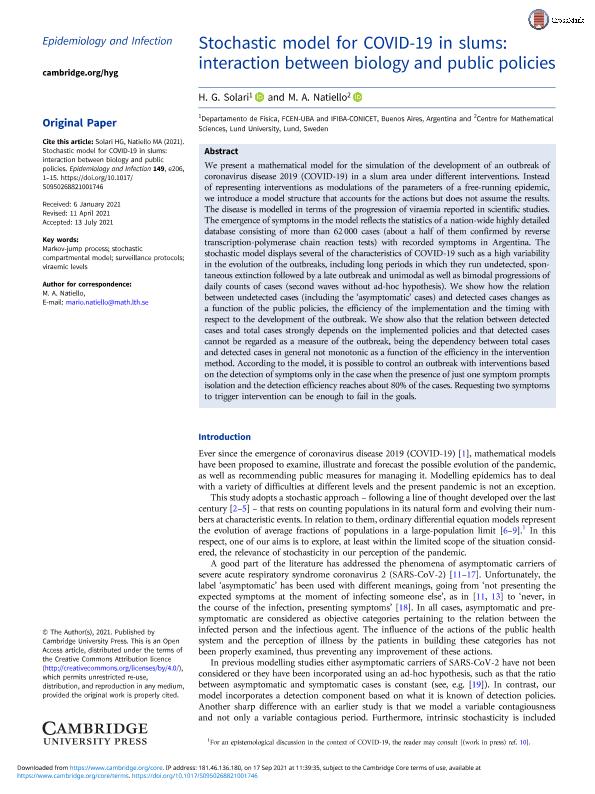Artículo
Stochastic model for COVID-19 in slums: Interaction between biology and public policies
Fecha de publicación:
07/2021
Editorial:
Cambridge University Press
Revista:
Epidemiology and Infection
ISSN:
0950-2688
Idioma:
Inglés
Tipo de recurso:
Artículo publicado
Clasificación temática:
Resumen
We present a mathematical model for the simulation of the development of an outbreak of coronavirus disease 2019 (COVID-19) in a slum area under different interventions. Instead of representing interventions as modulations of the parameters of a free-running epidemic, we introduce a model structure that accounts for the actions but does not assume the results. The disease is modelled in terms of the progression of viraemia reported in scientific studies. The emergence of symptoms in the model reflects the statistics of a nation-wide highly detailed database consisting of more than 62 000 cases (about a half of them confirmed by reverse transcription-polymerase chain reaction tests) with recorded symptoms in Argentina. The stochastic model displays several of the characteristics of COVID-19 such as a high variability in the evolution of the outbreaks, including long periods in which they run undetected, spontaneous extinction followed by a late outbreak and unimodal as well as bimodal progressions of daily counts of cases (second waves without ad-hoc hypothesis). We show how the relation between undetected cases (including the 'asymptomatic' cases) and detected cases changes as a function of the public policies, the efficiency of the implementation and the timing with respect to the development of the outbreak. We show also that the relation between detected cases and total cases strongly depends on the implemented policies and that detected cases cannot be regarded as a measure of the outbreak, being the dependency between total cases and detected cases in general not monotonic as a function of the efficiency in the intervention method. According to the model, it is possible to control an outbreak with interventions based on the detection of symptoms only in the case when the presence of just one symptom prompts isolation and the detection efficiency reaches about 80% of the cases. Requesting two symptoms to trigger intervention can be enough to fail in the goals.
Archivos asociados
Licencia
Identificadores
Colecciones
Articulos(IFIBA)
Articulos de INST.DE FISICA DE BUENOS AIRES
Articulos de INST.DE FISICA DE BUENOS AIRES
Citación
Solari, Hernan Gustavo; Natiello, Mario Alberto; Stochastic model for COVID-19 in slums: Interaction between biology and public policies; Cambridge University Press; Epidemiology and Infection; 149; 7-2021; 1-15
Compartir
Altmétricas




